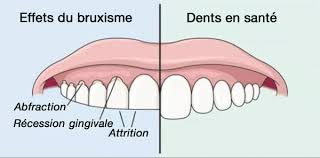Your medical advisor
Xavier Bourquin

Contact me on WhatsApp
[ht-ctc-chat]

Bruxism is defined as the involuntary grinding of the teeth. It is a disorder that both adults and children can suffer from. The severity and extent of bruxism can vary throughout life.
In severe cases, one affected person may experience facial pain, while another may, at first, not experience significant discomfort. People who tend to grind their teeth often do so in their sleep. It often happens that the noise produced is the first indicator of this habit. If a person grinds their teeth in their sleep, it is not uncommon for their partner, spouse or parents to hear it.
Teeth grinding occurs most often during sleep because the pressure exerted on the teeth is greater than that exerted during periods of wakefulness. Jaw clenching occurs when a person is tense and awake, such as when working on a computer, attending a meeting, or performing a task that requires concentration, such as driving a car.
People who grind their teeth often have the same symptoms:
– Pain in the jaws
– Pain in the cheeks
– Pain in the temples
– Pain in front of the ear, especially on waking
– Accelerated wear of the tooth surface.
What are the causes of bruxism?
Other factors likely to be at the origin of bruxism or to promote it have been put forward: the consumption of alcohol and tobacco, visceral and parasitic problems, endocrine disorders or even neurological disorders.
Bruxism can be likened to a behavioral disorder. Bruxism manifests itself mainly during the night, it is also associated with other sleep disorders (insomnia etc.).
1. If you grind your teeth while sleeping, your dentist may recommend that you wear a custom-fitted aligner, which will help distribute the pressure throughout the jaw and create a barrier preventing the upper teeth from coming into contact with the teeth. lower teeth. Some people are better able than others to tolerate such a gutter.
2. If you grind your teeth when you wake up, try to be sensitive to this habit and correct it. Your dentist may suggest techniques to help you relax or loosen your jaw during the day.
3. Do activities that reduce stress, such as physical activity, yoga, meditation, deep breathing exercises, massage, listening to music, or taking a bath.
Xavier Bourquin

Contact me on WhatsApp